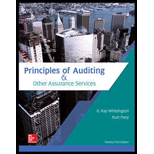
Principles Of Auditing & Other Assurance Services
21st Edition
ISBN: 9781259916984
Author: WHITTINGTON, Ray, Pany, Kurt
Publisher: Mcgraw-hill Education,
expand_more
expand_more
format_list_bulleted
Question
Chapter 1, Problem 36OQ
To determine
Identify the type of auditor and class of work for the given statements.
Expert Solution & Answer
Want to see the full answer?
Check out a sample textbook solution
Students have asked these similar questions
The direct material price variance is
Bradford Enterprises estimated manufacturing overhead for the year at $350,000. Manufacturing overhead for the year was underapplied by $15,000. The company applied $300,000 to Work in Process. The amount of actual overhead would have been_____.
What was its charge for depreciation and amortization of this financial accounting question?
Chapter 1 Solutions
Principles Of Auditing & Other Assurance Services
Ch. 1 - Prob. 1RQCh. 1 - Prob. 2RQCh. 1 - Prob. 3RQCh. 1 - Prob. 4RQCh. 1 - Prob. 5RQCh. 1 - Prob. 6RQCh. 1 - Prob. 7RQCh. 1 - Prob. 8RQCh. 1 - Prob. 9RQCh. 1 - Prob. 10RQ
Ch. 1 - Prob. 11RQCh. 1 - Prob. 12RQCh. 1 - Describe briefly the function of the GAO.Ch. 1 - Prob. 14RQCh. 1 - Prob. 15RQCh. 1 - Prob. 16RQCh. 1 - Prob. 17RQCh. 1 - Prob. 18RQCh. 1 - Prob. 19RQCh. 1 - Prob. 20RQCh. 1 - Prob. 21RQCh. 1 - Prob. 22RQCh. 1 - What characteristics make an accounting...Ch. 1 - Prob. 24RQCh. 1 - Prob. 25QRACh. 1 - A corporation is contemplating issuing debenture...Ch. 1 - Prob. 27QRACh. 1 - Prob. 28QRACh. 1 - Prob. 29AOQCh. 1 - Prob. 29BOQCh. 1 - Prob. 29COQCh. 1 - Prob. 29DOQCh. 1 - Prob. 29EOQCh. 1 - Prob. 29FOQCh. 1 - Prob. 29GOQCh. 1 - Which of the following did not precipitate the...Ch. 1 - Prob. 29IOQCh. 1 - Prob. 29JOQCh. 1 - Prob. 29KOQCh. 1 - Prob. 29LOQCh. 1 - Prob. 30OQCh. 1 - Prob. 31OQCh. 1 - Prob. 32OQCh. 1 - Prob. 33OQCh. 1 - Prob. 34OQCh. 1 - Prob. 35OQCh. 1 - Prob. 36OQCh. 1 - Prob. 37PCh. 1 - Prob. 38PCh. 1 - Will Williams, a college senior, has begun the...Ch. 1 - Smith Co., a local Dallas public accounting firm,...
Knowledge Booster
Similar questions
arrow_back_ios
SEE MORE QUESTIONS
arrow_forward_ios
Recommended textbooks for you
 Auditing: A Risk Based-Approach (MindTap Course L...AccountingISBN:9781337619455Author:Karla M Johnstone, Audrey A. Gramling, Larry E. RittenbergPublisher:Cengage Learning
Auditing: A Risk Based-Approach (MindTap Course L...AccountingISBN:9781337619455Author:Karla M Johnstone, Audrey A. Gramling, Larry E. RittenbergPublisher:Cengage Learning Auditing: A Risk Based-Approach to Conducting a Q...AccountingISBN:9781305080577Author:Karla M Johnstone, Audrey A. Gramling, Larry E. RittenbergPublisher:South-Western College Pub
Auditing: A Risk Based-Approach to Conducting a Q...AccountingISBN:9781305080577Author:Karla M Johnstone, Audrey A. Gramling, Larry E. RittenbergPublisher:South-Western College Pub

Auditing: A Risk Based-Approach (MindTap Course L...
Accounting
ISBN:9781337619455
Author:Karla M Johnstone, Audrey A. Gramling, Larry E. Rittenberg
Publisher:Cengage Learning

Auditing: A Risk Based-Approach to Conducting a Q...
Accounting
ISBN:9781305080577
Author:Karla M Johnstone, Audrey A. Gramling, Larry E. Rittenberg
Publisher:South-Western College Pub
